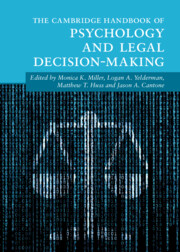Book contents
- The Cambridge Handbook of Psychology and Legal Decision-Making
- Cambridge Handbooks in Psychology
- The Cambridge Handbook of Psychology and Legal Decision-Making
- Copyright page
- Dedication
- Contents
- Figures
- Tables
- Editors
- Contributors
- Part I Introduction Chapters
- Part II Pretrial Phase Decision-Making
- Part III Trial Phase Decision-Making
- Part IV Postconviction Phase Decisions
- Part V Other Legal Decision-Making
- 34 Decision-Making in Immigration Court
- 35 Evaluation Decisions by Psychologists about Causation and Damages in Personal Injury and Employment Discrimination Cases
- 36 Factors Influencing the Decision to Commit White-Collar Crime
- 37 Tort Law Decision-Making
- 38 Judicial Decision-Making in Juvenile Dependency and Juvenile Justice Cases
- 39 Legislative Decision-Making
- 40 Decision-Making in Alternative Dispute Resolution
- 41 Criminal Decision-Making
- 42 Social Worker Decision-Making
- 43 Decision-Making in Civil Matters
- Part VI Perspectives from the Field
- Part VII Conclusion
- Index
- References
42 - Social Worker Decision-Making
A Framework for Legally Literate Accountable Practice
from Part V - Other Legal Decision-Making
Published online by Cambridge University Press: 22 February 2024
- The Cambridge Handbook of Psychology and Legal Decision-Making
- Cambridge Handbooks in Psychology
- The Cambridge Handbook of Psychology and Legal Decision-Making
- Copyright page
- Dedication
- Contents
- Figures
- Tables
- Editors
- Contributors
- Part I Introduction Chapters
- Part II Pretrial Phase Decision-Making
- Part III Trial Phase Decision-Making
- Part IV Postconviction Phase Decisions
- Part V Other Legal Decision-Making
- 34 Decision-Making in Immigration Court
- 35 Evaluation Decisions by Psychologists about Causation and Damages in Personal Injury and Employment Discrimination Cases
- 36 Factors Influencing the Decision to Commit White-Collar Crime
- 37 Tort Law Decision-Making
- 38 Judicial Decision-Making in Juvenile Dependency and Juvenile Justice Cases
- 39 Legislative Decision-Making
- 40 Decision-Making in Alternative Dispute Resolution
- 41 Criminal Decision-Making
- 42 Social Worker Decision-Making
- 43 Decision-Making in Civil Matters
- Part VI Perspectives from the Field
- Part VII Conclusion
- Index
- References
Summary
Social workers make decisions every day involving the protection of children and/or adults who are at risk of, or are experiencing, abuse and neglect, exercising power and authority derived from law. Social workers must act within the law: “doing things right.” Accountable, legally literate practice additionally includes standards from administrative law when statutory duties are used. However, decision-making frequently also raises ethical dilemmas, including whether, when, and how to intervene in people’s lives. Practice must, therefore, be ethically literate: “doing right things.” Human rights, equality, and social justice issues will also feature in social work decision-making: “right thinking.” This chapter presents a framework for social worker decision-making that is legally and ethically, but also emotionally, relationally, organizationally and knowledge, literate. It proposes that this framework is transferable across the different jurisdictions within which social workers practice, and that it helps social workers to make good as well as lawful decisions.
Keywords
- Type
- Chapter
- Information
- The Cambridge Handbook of Psychology and Legal Decision-Making , pp. 647 - 663Publisher: Cambridge University PressPrint publication year: 2024

